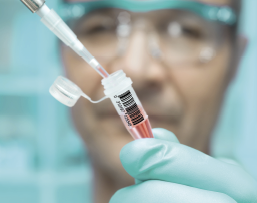Investigational Biologic Benefits Patients With Multidrug-Resistant HIV in Phase 3 Trial
 Treatment with the investigational biologic ibalizumab (TaiMed Biologics/Theratechnologies) appeared to safely reduce the viral loads of patients with multidrug-resistant HIV, according to late-breaking phase III trial results recently presented at ID Week.
Treatment with the investigational biologic ibalizumab (TaiMed Biologics/Theratechnologies) appeared to safely reduce the viral loads of patients with multidrug-resistant HIV, according to late-breaking phase III trial results recently presented at ID Week.
“These results are particularly exciting as ibalizumab, if approved by the FDA, would be the first long-acting biologic to show such efficacy in patients with highly resistant HIV-1,” Jacob Lalezari, MD, medical director for Quest Research, said in a press release. “The study suggests that when combined with other agents, ibalizumab could help these patients in dire need of new treatment options, and could change the way multidrug-resistant HIV is managed in the future.”
To investigate the novel monoclonal antibody, Dr Lalezari and colleagues enrolled 40 HIV patients with a history of multiple treatment failures. Researchers intravenously administered a loading dose of 2000 mg ibalizumab alone or alongside the patients’ current failing therapy, and continued the treatment at 800 mg every other week for 24 weeks.
After the first week, Dr Lalezari and colleagues reported viral load declines of at least 0.5 log10 from baseline among 83% of patients (P < .0001), as well as declines of at least 1.0 log10 among 60% (P < .0001). The average decrease among all of the participants was 1.1 log10 (P < .0001), and there no serious adverse events or discontinuations.
According to Dr Lalezari and colleagues, more than than 85% of the patients’ viruses contained mutations associated with resistance to nucleoside reverse transcriptase inhibitors, non-nucleoside reverse transcriptase inhibitors, or protease inhibitors, while more than 60% had resistance to one or more integrase inhibitors. In addition, half had infections that were not susceptible to every available drug from at least three classes of antiretroviral therapy.
In a release, Dr Lalezari said this treatment is the first HIV treatment in years to show activity in highly resistant patients, “which is very exciting for these vulnerable patients and those who care for them.” This sentiment was shared by Daniel R Kuritzkes, MD, professor of medicine at Harvard Medical School and chief of the infectious disease division at Brigham and Women’s Hospital, who noted that the drug’s greatest benefit will likely be felt by “a small but challenging” group of patients.
“This will not be a first- or second-line therapy for those who are infected with HIV, but it may be helpful for certain patients,” he said in the release. —Dave Muoio











